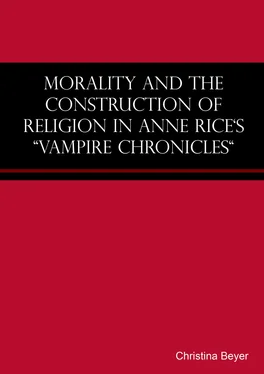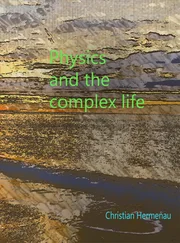A different perception of Rice’s recreation process is given by Sandra Tomc. She focuses on the absence of female characters in the novels. For her, the creation of a new vampire type represents a process of liberation (Whether sexual, gay, or women’s) (Tomc 96). Tomc sees in the male – male relationship a sign of equality between two beings (Tomc 97). Still, their ability to recreate life is striking for the needlessness of femininity in Interview with the Vampire. Being able to create new vampires without the need of a woman emphasizes the variety of roles that Rice’s vampires can play (Tomc 99).
“When Louis and Lestat make a vampire out of Claudia, they do so quite literally over her mother’s dead body. Discovering the still human little girl alone in a house and crying over the corpse of her mother, Louis is at first aware of some mysterious and powerful maternal power that emanates from the mother and challenges his own claims to Claudia. But this “natural“ maternity is soon exposed as the inferior stuff of mortal frailty.“ (Tomc 98) This obvious unnecessariness of female characters shows how many roles can be played by just one of Rice’s characters. They can be lover, father and son at the same time, without contradictions (Tomc 99).
By receiving an insight into the possible roles a vampire can play in Rice’s novels, we get an idea of what life is like for this strange creation. The detailed description of their superiority and inner conflicts takes away the estrangement that usually comes along with the otherness of the monster. The reversed point of view and the revelation of vampire secrets take away an uncanny feeling that may have been created in other stories such as Dracula. Still, the otherness of the monster does not vanish just by being mentioned. Instead, since attributes of the vampire are known, now the vague feeling of being threatened by something unknown is confirmed.
The vampire crosses boarders of the possible by feeding on blood and surviving death and – as a consequence – his own times. Also, he crosses boundaries of the possibilities of society by living out desires of a different lifestyle. The alternative family formation of Louis, Lestat and Claudia is only one example for that. This double transcendence of boundaries is exactly what creates the otherness in Rice’s novels, and by having different concepts of life outside of a general society, human moral standards also vary, since they are no longer applicable to something that stands as a representative of otherness, such as Louis or Lestat.
Therefore, if the vampire is portrayed as the counterpart to what is considered to be normal, is it possible for him to still be part of a community and to live according to moral standards? As shown previously, with the otherness of the vampire, the outlook on society and moral standards inevitably changes. To be able to judge Louis for the conflict he experiences between his actions and his beliefs, the first thing that needs to be done is to have a closer look on the question if human morality is applicable to someone who is (no longer) human. In order to do that, it is helpful to take a closer look at how personhood can be defined. Having answered this question, it is important to see what is necessary to be part of a moral community.
The Vampire and the moral community
At this point, a short explanation on how philosophers such as Immanuel Kant or David Hume define the importance to form social groups and in how far this is important for defining moral rights will be given. Portraying these philosophical ideas will allow to see if the vampire can be regarded as part of a moral community or not and what consequences follow in either case.
According to Nicolas Michaud, it is relevant to ask for the criteria of personhood in order to come to a conclusion on how to make these moral judgments for someone outside the human community. He defines a person as ‘a bearer of rights, someone worthy of respect.‘ (Michaud 39) He introduces the philosopher Mary Anne Warren, who is concerned with the question “What qualities would a being possess to make humans consider that being a part of the moral community?“ She comes up with five suggestions: 1) consciousness, 2) reasoning, 3) self-motivated activity, 4) the capacity to communicate and 5) the presence of self-concepts (Michaud 41). All of the above mentioned criteria are relevant for Anne Rice’s vampires. Louis is described as a very reflective, well-educated nobleman and Lestat does not lack self-motivated activity and challenges concepts such as the Christian religion and morality. Moreover, none of Rice’s vampires lack the ability to communicate. Therefore, from Warren’s perspective, there would be no reason to deny the vampire his personhood.
However, unfortunately, personhood always brings obligations to its holder. Michaud gives a short outlook on Kant’s ethics, for whom personhood requires rationality and the ability to think. Only because of these abilities, someone is worthy of having rights and deserves respect and dignity (Michaud 40). For Kant, a collective will is important for keeping the personal right to guarantee safety for every citizen. Since the will of a single person can interfere with the will of another person, there has to be a universal law which clarifies property relations and prohibits any violation against the personal freedom of a person (Kant, Metaphysik der Sitten 256). To keep it simple, Kant argues that no one could want to become a victim of another’s person’s will to hurt or even kill another person. “Kant’s concern is not with how people should interact, as a matter of ethics, but with how they can be forced to interact, as a matter of right.“ (Ripstein 162) The ultimate goal should be to respect the independence of another person by not interfering with it in any way (Ripstein 162).
Ripstein names a few examples of possible interferences with the independence of another being, such as bodily injury (Ripstein 162). Furthermore, he points out that “Interference with another person’s freedom creates a form of dependence; independence requires that one person not be subject to another person’s choice“ (Ripstein 162). Moreover, autonomy is important for Kant’s idea of freedom. Ripstein gives some examples to clarify situations of dependence and independence.
“(...) in principle a slave with a benelovent master and favourable circumstances could be autonomous in the contemporary technical sense. A slave could never be independent, because what he is permitted to do is always dependent on his master’s choice or grace.“ (Ripstein 163)
Therefore, universal rules are necessary in order to prevent any kind of violence against another person or his/her property. Personal interests and desires are different for everyone; therefore, it can become inevitable to keep others from fulfilling their wishes in order to keep the safety of a community. Kant thinks it is necessary to establish rules to prohibit violence and to hinder people from acting exclusively on their personal wishes. Therefore, freedom is not the possibility to act upon one’s will. Instead, it defines itself through the way in which people interact (Ripstein 163).
So, according to Kant, morality can only be defined within a moral community. That starts with the definition of freedom, which is always dependent on the interaction between at least two independent persons. Without a community, morality is not even relevant, simply because it requires interactions.
What we can learn from this is that the vampire is necessarily part of that community, even if he interferes with the victim’s ability to perform according to his or her own will, because he interacts with another person. According to this definition, it can be said that he is a person because of his rationality and ability to think, and also because of his interactions with other members of that community. As a conclusion, this means that from Kant’s point of view, he has moral obligations and therefore, by permanently penetrating rules, deserves punishment, so that the freedom of other members of the community can be reestablished. As a final explanation, Kant is known as a “rationalist“. This term defines a philosophical view in which no consequences of an action should be considered. The act itself has moral value. Justifications such as having the “need“ to drink human blood would mean nothing to Kant.
Читать дальше









